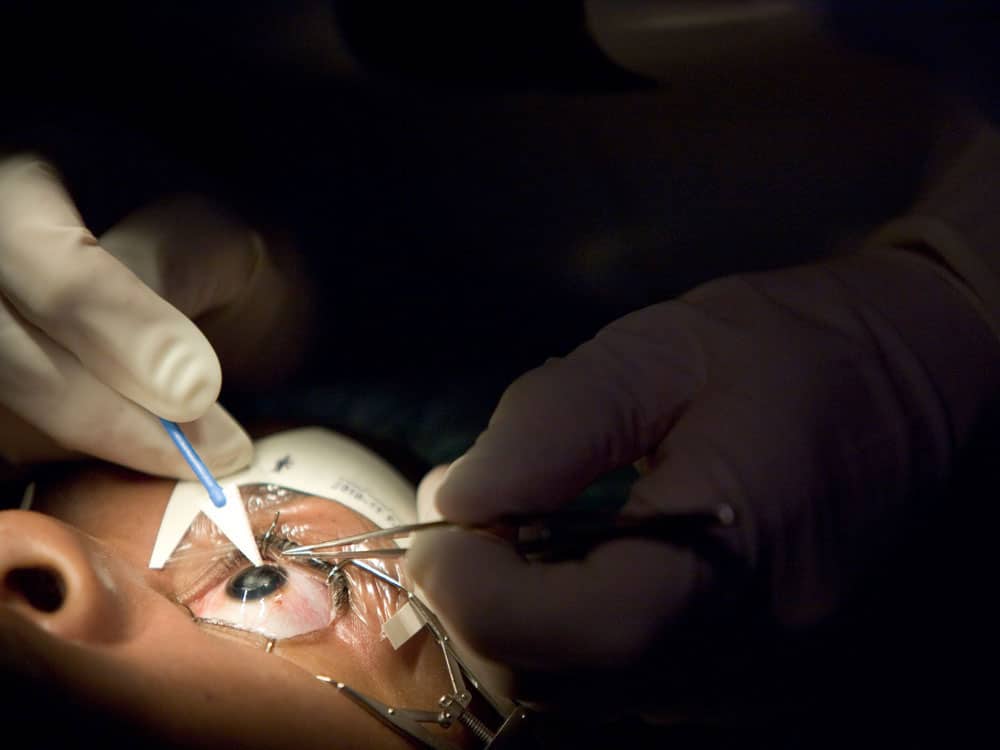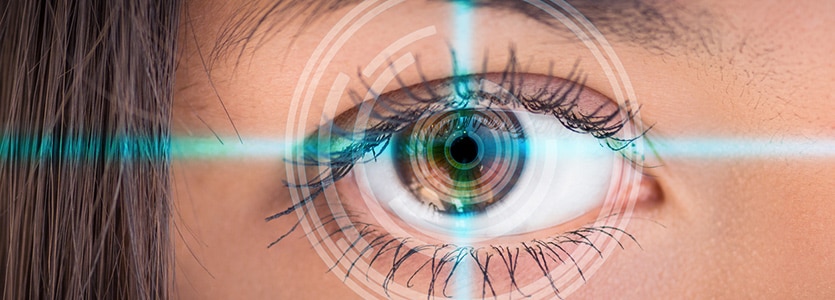-
- If you start each day by looking in the mirror trying to picture yourself without eyeglasses, constantly misplace your prescription shades, and are tired of poking yourself in the eye with contact lenses each morning, you may be considering laser vision correction.Ever since its FDA approval in 1999, LASIK has been very popular. Also known as refractive surgery, laser eye surgery changes how the patient’s eye refracts light, improving their vision. When the cornea is not perfectly round, the light focuses irregularly on the retina in the back of the eye, causing a refractive error. LASIK corrects refractive errors in nearsightedness (myopia), farsightedness (hyperopia), and astigmatism (an irregularly shaped cornea) by changing the cornea’s shape.
Before your LASIK procedure, make sure you have a consultation with a reputable LASIK surgeon. There are just a few things you should ask during your consultation to ensure you’re receiving the best care:
Am I a good LASIK candidate?
Unfortunately, not everyone makes a good LASIK patient. Some people have eye conditions that will prevent them from having a LASIK procedure. To be a good candidate, you should have generally good eye health, sufficient corneal tissue for reshaping, and no current eye diseases, such as cataracts or glaucoma.
If you have a medical condition, consult with your physician before having any medical procedure. Your doctor should go over your medical history with you to determine if you’re a good LASIK candidate.
How many times has the doctor done a LASIK procedure?
LASIK vision correction surgery is, as the name implies, a surgery. Just as you wouldn’t want a podiatrist to handle your heart attack, you don’t want just any eye doctor to handle your LASIK surgery. Campus Eye Group can help connect you to qualified and experienced LASIK surgeons who are willing to walk through the procedure with you.
How much does LASIK cost?
The estimate your doctor gives you should include the procedure itself, any necessary preparation, preoperative exams, surgery center fees, and post-op care. Also, check if the office offers financing options.
Most insurance companies won’t cover LASIK as it’s an elective procedure, but you can discuss payment plans to ease the financial burden.
What are LASIK’s side effects?
All medical procedures have side effects– dry eye is the most common symptom after LASIK surgery. You may also see halos when you look at something bright after surgery. This is called the halo effect, and it happens because fluid is building in your cornea as part of the natural healing process. It is nothing to be concerned about and only lasts for a few weeks.
Your surgeon should be upfront with you about all possible side effects so you’re making a fully-informed decision. To decrease your risk of side effects, make sure to follow all pre- and post-operative instructions from your surgeon.
What will my vision be after LASIK?
Chances are, you will not be able to see perfectly immediately after LASIK surgery. Blurred vision or double vision is common for the first day or two, but you should start seeing much clearer after a few days.
How much does LASIK hurt?
LASIK surgery is practically pain-free– the doctor numbs your eyes before the procedure begins. It is normal to feel pressure on their eyes during the surgery, but any pressure that you feel will only last a couple of seconds.
What is the LASIK procedure?
There are five parts to LASIK. Each eye goes through the same process:
- The doctor gives you eye drops to numb the cornea.
- The first laser creates a corneal
- The second laser reshapes the
- The flap is put back in
- The process is repeated in the other
- LASIK surgery only takes about 15 minutes for both eyes.
Is age a factor?
If you are over 40, you likely need reading glasses, and LASIK does not correct the vision problems that come naturally with age. You can still get the surgery if you are healthy, but additional glasses will be necessary in some cases.
The Bottom Line
LASIK eye surgery is a great solution to the annoyance and inconvenience of glasses or contact lenses. Campus Eye Group is here to help you find a solution that works, and walk with you every step of the journey. If you’re interested in improving your vision, schedule your consultation with Campus Eye Group to get answers to all your questions.
- If you start each day by looking in the mirror trying to picture yourself without eyeglasses, constantly misplace your prescription shades, and are tired of poking yourself in the eye with contact lenses each morning, you may be considering laser vision correction.Ever since its FDA approval in 1999, LASIK has been very popular. Also known as refractive surgery, laser eye surgery changes how the patient’s eye refracts light, improving their vision. When the cornea is not perfectly round, the light focuses irregularly on the retina in the back of the eye, causing a refractive error. LASIK corrects refractive errors in nearsightedness (myopia), farsightedness (hyperopia), and astigmatism (an irregularly shaped cornea) by changing the cornea’s shape.
Why Do People Still Need Glasses after having LASIK surgery?
If someone you know still wears reading glasses after having LASIK surgery, you may have some questions, especially if you are considering having the procedure done yourself. After all, LASIK surgery corrects vision problems like myopia (nearsightedness) and astigmatism permanently, so many assume it eliminates the need for glasses or contact lenses.
It turns out, requiring “readers” after having LASIK surgery is a common, natural occurrence for many people over the age of 40 due to a condition called presbyopia.
What Is Presbyopia?
Presbyopia, or “aging eye,” is a condition where the eye naturally loses the ability to focus on objects up close. This makes it difficult to read small print or clearly see objects close to the eye. It is a normal result of aging that affects many people beginning in their mid-40s and gradually worsens until around age 65.
Some of the symptoms of presbyopia include:
- Headaches after reading up close
- Blurred vision at a normal reading distance
- Needing to hold reading material away from the face
What Causes Presbyopia?
Even if you have great eyesight in your younger years, you can still develop presbyopia.
When you look at something closely, your eye’s lens and ciliary muscles constrict so they can focus light onto the retina more clearly. As you age, your lens and ciliary muscles harden and lose the ability to change shape and focus light as effectively, causing your vision to blur up close.
Presbyopia Risk Factors
While presbyopia is mostly an age-related condition, certain risk factors can increase your likelihood of developing it prematurely. These risk factors include:
- Having diabetes
- Being naturally farsighted
- Taking certain drugs (antidepressants, antihistamines and diuretics)
Can LASIK Correct Presbyopia?
LASIK surgery is used to correct myopia and refractive errors like astigmatism and hyperopia – but not problems stemming from presbyopia. It is possible to have presbyopia and another type of refractive error simultaneously, so older adults may still want to have LASIK performed.
If you are nearsighted, or you can see clearly up close but not far away, LASIK may cause you to lose some of your ability to see up close earlier than usual. Similarly, if your vision is fully corrected for distance, you are more likely to need reading glasses once presbyopia develops.
Presbyopia Solutions
Monovision
If you are an older adult considering LASIK, ask your doctor about correcting your vision for monovision. This procedure treats one eye for nearsightedness and the other for farsightedness, effectively providing clearer vision at any distance. It can be difficult for your eyes to get used to this though, so it is not for everyone. Consider doing a trial with contact lenses first.
Intraocular Lens Implants
Intraocular lens implants (IOLs) are another potential solution for people who want to correct their “aging eye” without relying on readers. IOLs are artificial lenses that correct refractive errors while permanently replacing your natural lenses. Presbyopia-correcting IOLs are a more recent development that are typically used with patients who do not qualify for laser refractive surgery.
Vision Solutions in Mercer and Bucks Counties
Whether you are considering LASIK or have questions about potential presbyopia solutions, Campus Eye Group offers the latest advancements in vision correction and treatment. Some of our comprehensive services include IOLs, LASIK and, of course, eyeglasses and contact lenses.
For more information or to schedule an appointment, call 609-587-2020 or visit us online today!




